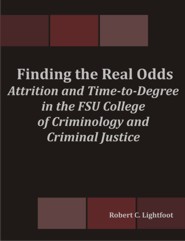
Finding the Real Odds
Attrition and Time-to-Degree in the FSU College of Criminology and Criminal Justice
by Robert C. Lightfoot

- Number of Pages: 259
- ISBN-10: 1599427168
- ISBN-13: 9781599427164
- Publisher:
Dissertation.com
- Year: 2007
- Category:
Education, Law & Legal Studies
 View First 25 Pages:
View First 25 Pages:
 (free download)
(free download) Synopsis
Attrition and time-to-degree issues remain poorly understood in academia, and almost completely unexplored in criminology and criminal justice. Loss rates of fifty percent or more are common in the social sciences, while the success rates for criminal justice are unknown for most schools. This study attempts to investigate completion levels at the Florida State University (FSU) College of Criminology and Criminal Justice, using descriptive and inferential techniques, survival analysis, and questionnaires. Problems with data collection impeded analysis of even basic statistical operations, resulting in the exclusion of some independent variables due to unavailability of readily obtainable information. Both the Master's and Ph.D. programs had similar attrition rates, with nearly two-thirds of students completing the programs. The M.A. program was around two years, and the terminal level alone was a little over six years. Recommendations concerning data handling and retention for the College and for FSU follow, along with suggestions for national initiatives to address some of the problematic situations concerning lack of national recognition for criminology and criminal justice.
About the Author
Robert C. Lightfoot is an Assistant Professor at Waycross College. He received his Ph.D. in Criminology/Criminal Justice from FSU in Fall Semester, 2007. His research interests include unmarked human burial relocation, non-traditional student issues, and student retention in Criminology/Criminal Justice.




 View or Post a Review at Amazon.com
View or Post a Review at Amazon.com